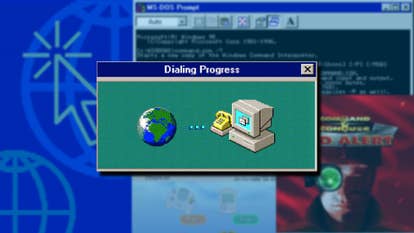Entertainment
AOL Retires Dial-Up Service After 30 Years, Reflects on Impact

AOL has officially retired its dial-up internet service, marking the end of a significant chapter in internet history. After over 30 years, the company has phased out a service that once connected millions of users to the online world. While this closure might come as a surprise to some, given that AOL was still providing this service, its legacy in shaping early internet use and online gaming is undeniable.
AOL played a pivotal role in introducing the internet to a broad audience, particularly in the United States, where its name became synonymous with online connectivity. Although the service was most popular in the US, AOL also made its mark in countries like the UK. Many users recall receiving promotional disks in their newspaper, a common marketing strategy during the 1990s. These disks often led newcomers to a vibrant yet primitive online landscape filled with early gaming experiences and news portals.
Recollections of Dial-Up Gaming
The experience of gaming on dial-up was unique, often marked by nostalgia and frustration. For many, the connection process was an adventure in itself. The sounds of the modem, with its distinctive “eee-orr, eee-orr” tones, evoke memories of anticipation and anxiety. Those sounds represented both the potential for connection and the looming threat of disconnection, whether from a game crash or a family member picking up the phone.
For players like one anonymous enthusiast, the memory of attempting to engage with Ultima Online on a less-than-ideal computer is vivid. The combination of poor hardware and dial-up internet resulted in an experience that was often frustrating yet thrilling. The unpredictability of the connection added an element of risk, as players navigated dungeons, knowing that a disconnect could happen at any moment.
Another user fondly recalls the early days of internet fan culture. Websites dedicated to games, such as the now-defunct Hyrule: The Land of Zelda, were gateways to community engagement. Users would spend hours speculating about game secrets, reveling in the slow-loading pages filled with fan theories and hopes for upcoming titles. The slower speeds of dial-up cultivated a sense of appreciation for the content, contrasting sharply with today’s instant access to information.
Innovative Consoles and Early Online Play
The advent of gaming consoles like the Dreamcast marked a significant point in the evolution of online gaming. The Dreamcast’s ability to connect to the internet allowed players to experience online multiplayer games, a novel concept at the time. Titles such as Toy Commander offered a glimpse into the future of gaming, even if the connection often resulted in high phone bills.
Downloading content during this era was a slow process. Early downloadable content (DLC) was minimal, with players eagerly awaiting updates. Even something as simple as Christmas-themed decorations for Sonic Adventure felt revolutionary. For many, these moments defined their early gaming experiences and fostered a sense of community among players navigating the limitations of dial-up.
Memories of accessing game-related content often extend beyond gaming itself. One player recalls the excitement of seeing early footage of Sonic Adventure thanks to a friend’s access to a free dial-up connection. The thrill of witnessing a new game reveal in real-time, albeit in low resolution, was a highlight of the era, illustrating the profound impact of early internet connectivity on gaming culture.
The challenges of online gaming during the dial-up era were numerous. Players often faced the frustration of lag and disconnections. One user reminisced about their attempts to play Command & Conquer Red Alert, struggling to grasp competitive mechanics while also navigating the interruptions of family life. The experience was often less about winning and more about the adventure of connecting with others in the gaming community.
In conclusion, the retirement of AOL’s dial-up service signifies more than just the closure of a product; it marks the end of an era that shaped the landscape of online gaming and internet culture. While the service may be gone, its legacy continues to resonate with those who experienced the early days of connectivity, reminding us of a time when the internet was a new frontier filled with possibilities and challenges.
-

 Entertainment2 months ago
Entertainment2 months agoAnn Ming Reflects on ITV’s ‘I Fought the Law’ Drama
-

 Entertainment3 months ago
Entertainment3 months agoKate Garraway Sells £2 Million Home Amid Financial Struggles
-

 Entertainment2 months ago
Entertainment2 months agoCoronation Street’s Carl Webster Faces Trouble with New Affairs
-

 Health2 months ago
Health2 months agoKatie Price Faces New Health Concerns After Cancer Symptoms Resurface
-

 Entertainment1 month ago
Entertainment1 month agoWhere is Tinder Swindler Simon Leviev? Latest Updates Revealed
-

 Entertainment3 months ago
Entertainment3 months agoKim Cattrall Posts Cryptic Message After HBO’s Sequel Cancellation
-

 Entertainment2 months ago
Entertainment2 months agoMasterChef Faces Turmoil as Tom Kerridge Withdraws from Hosting Role
-

 Entertainment3 months ago
Entertainment3 months agoSpeculation Surrounds Home and Away as Cast Departures Mount
-

 World1 month ago
World1 month agoCole Palmer’s Mysterious Message to Kobbie Mainoo Sparks Speculation
-

 Entertainment2 months ago
Entertainment2 months agoITV’s I Fought the Law: Unraveling the True Story Behind the Drama
-

 Entertainment1 month ago
Entertainment1 month agoCaz Crowned Winner of The Great British Sewing Bee, Overjoyed by Triumph
-

 Entertainment3 months ago
Entertainment3 months agoMarkiplier Addresses AI Controversy During Livestream Response




















